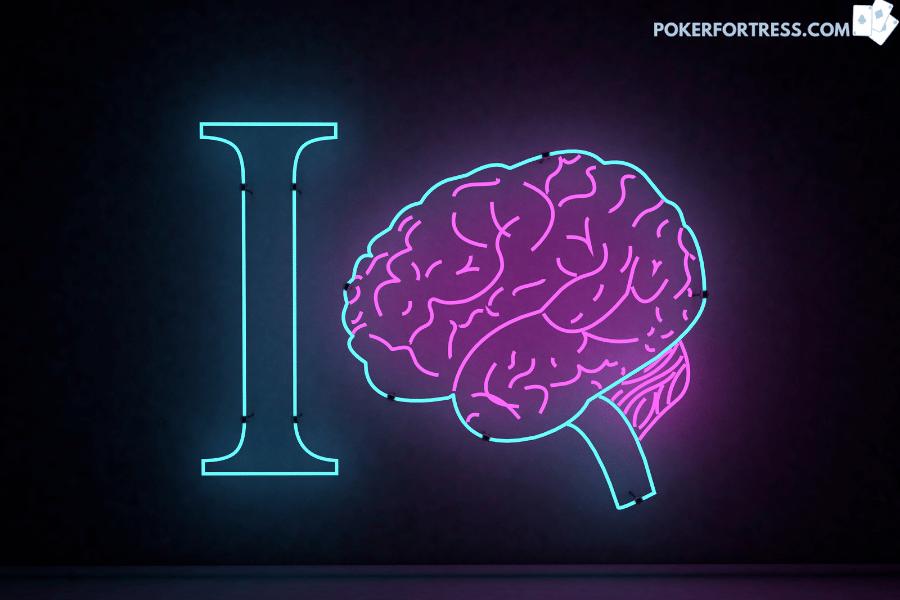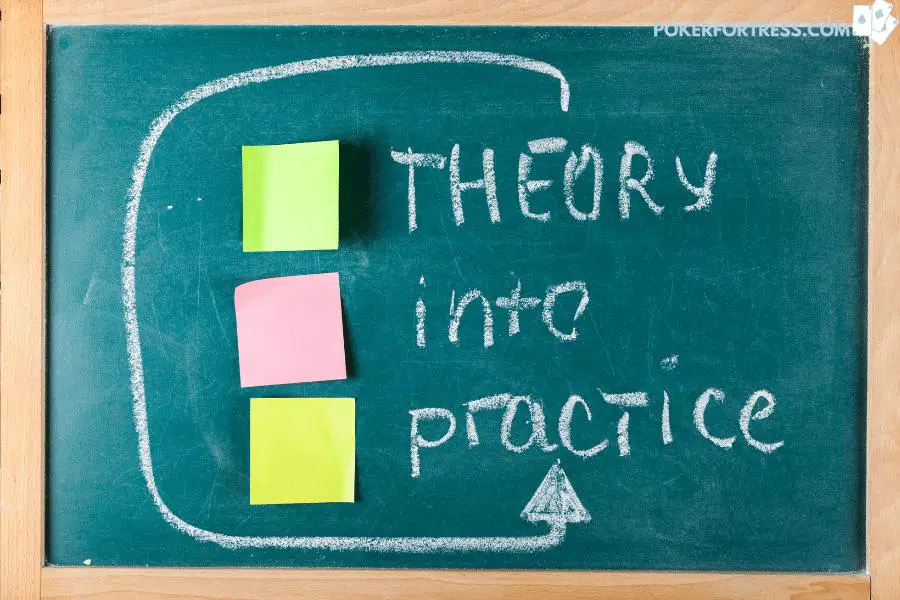While poker is widely considered as a casual and competitive game, the wit and strategic mindset entailed is nothing short of admirable. The complex world of pro poker players has been somewhat mysterious and mesmerizing for the masses. But, just how smart are poker players?
Professional poker players do have a higher than average IQ, but this is not a specific requirement. Natural talent and hard work can also lead to wins, and the intellectual benefits of poker playing will be advantageous to any individual regardless of their IQ.
It’s commonly known that poker entails far more than having ‘cards up your sleeve’ to win, it requires advantages brought by innate mental awareness and sharp cunning abilities. If you play poker as it was intended, there are plenty of aspects that will boost mental strength and cognitive function – from the game itself to the environment and opponents. Stick around to find out how poker players benefit from these factors.

Does poker require intelligence?
You don’t have to necessarily be a mathematician in disguise to be good at poker, but the game itself does entail a stupendous amount of intelligence. While being dealt a good hand is of course a major advantage in any game, a successful outcome within a game of poker is majorly dependent on the effective use of intellect, tact, and wit.
Playing poker clean and efficiently predominantly requires ample of strategic thinking, mental awareness, cunning abilities, abstract math skills, and the ability to read your opponents accurately.
This is not to say that only geniuses can play poker, and the idea that innate intelligence is a barrier to entry is a common misperception.
The game of poker involves far more than intellect, it entails a variety of types of intelligence and utilizes these bits of intelligence in unison throughout the game. Things like making decisions, understanding people, and building a healthy balanced mindset throughout the game require a complex combination of intelligence, abilities, and skills.
It’s not simply about having a high IQ, and being good at math – although those things will definitely help. It’s about knowing how to use whatever intelligence and skills you have in combination with logic, probability and fact, in order to predict and manipulate the game to your advantage.
What percentage of poker players are winners?
On average, approximately 15 – 25% of serious poker players are profitable and have more wins than losses. However, this predominantly comes down to the approach of the poker player, and the rewards for those who fall within this group are mainly as a result of research, practice, trial and error, and hard work. No poker player starts off as a winner, and there will always be a series of losses that aid in developing the skills needed to become a winner.
There is also the question of what is considered as a ‘winner’, since there are many perceptions of this term. Most define a winner as someone who has a higher win to loss ratio, but many consider the term with monetary remuneration in mind as opposed to the amount of games won.
If being a ‘winner’ comes down to the overall profit gained from poker games, then the figure would be quite low, as there are very few people who make a substantial amount of money through poker or earn enough to make a living. I believe that only around 2% of poker players are poker pros.
Other than the individual skills and intelligence of each opponent, there are a few factors that would result in some players being more profitable than others. These include opponent selection or player pool, table selection, and tilt management, all of which can be utilized to maximize profits effectively.
The rakeback can also affect the overall percentages of winners and losers within poker if the circumstances of the game allows for it. If it’s assumed that conditions for rakeback benefits are suitable, and everyone within the player pool takes advantage of rakeback, it may shift the ratio slightly since small losers may now break even and break even players may now become small winners as a result.
It is not uncommon that someone is a professional poker player just because he has a really good rakeback deal which more than doubles his income from poker.
Why do most poker players lose?
When one is going through a losing streak or making a loss with poker, of course they may just require more practice and experience. Experiencing bad or good luck is possible, but it’s much less probable than many people believe. Good luck does not follow every professional poker player, the player predominantly creates their own ‘luck’ where there is none.
In our detailed article about luck vs. skill in poker, you can read exactly how big of a role skill and luck play on the tables.
Many people attempt to play poker without understanding underlying influences that require research and practice, and ultimately leave emptyhanded or broke. This is due to the fact that these gaps in knowledge and understanding become massive weak spots that can be targeted and exploited by opponents who may know better.
There are a few common reasons why most poker players lose:
- Playing too Many Tables
Multi-tabling is one of the most common reasons why online poker players may have a higher amount of losses as opposed to wins. While the objective of multi-tabling is to play as many tables as possible, the necessary concentration, strategy, skill, and ability to play profitably across these tables is often overlooked.
- Not Enough Research
A large majority of poker players see the game as a recreational activity, and treat it as such. It’s important to understand that serious poker players who are profitable and have a high win to loss ratio have put in the hours to match their rewards.
Studying the game and all of the underlying influences of the game’s outcome is crucial in forming a solid base that one can actually practice and build poker related skills from. Those who lack the drive to get stuck into this part of poker will ultimately hit a knowledge cap, and will be stuck in a position where there cannot be growth until this continuous studying phase is invested into.
- Leaving Leaks in Your Game
Leaks refer to anything that could be costly in the long run, and could range from a missed opportunity to strategic insufficiencies. There are many novice poker players who fail to acknowledge or admit that there are existing leaks that need attention, which ultimately leads to large weak spots and summative losses over time.
There are often instances where minor alterations can make a massive difference throughout the game and provide an advantageous edge over opponents. Studying consistently and being self-aware will aid in recognizing potential leaks and addressing them accordingly.
- Practice makes Perfect
In addition to constant theory studying, one needs to apply practical learning to poker as well. In order to become good at poker and ultimately start winning games, it will require a commitment of time and consistent practice. If one is simply playing the game without studying, or simply studying without spending enough time at the tables, the likelihood of seeing improvement is slim.
Poker is evolving, as are its methods and the extensive knowledge of opponents. This is something to be mindful of when entering any poker game, and a good rule of thumb is to invest at least one hour of studying for each hour spent playing, thus applying an equal balance between both theory and practical learning approaches to poker.

- Lack of Focus
Building a solid concentration span is challenging in any kind of environment, and this is particularly impactful for most poker players. Those who have experience in poker have most likely already built a substantial amount of focus, and have the know-how with regard to limiting distractions.
This is an incredibly influential factor for poker players at any level, and it’s essential that newer poker players are mindful of their own distractibility during a game.
- Playing the Wrong Game
There are understandably preferences when it comes to poker games, as some variants may be more enjoyable or popular than others. However, if the goal is to be profitable and win, the focus should not be on enjoyment, but on results.
If it’s noted that a less favorable game frequently results in higher profits, then that’s the game that should be played, even though it’s not preferred – at least until there has been significant improvement in the preferred variant.
- Insufficient Bankroll Management
Keeping a watchful eye on the bankroll in relation to the game being played will have a massive impact on the outcome, as it’s vital to understand the principles of budgeting and calculating loss vs. profit throughout the game. One should be growing their bankroll, not simply replenishing funds, and a lack of tracking these fluctuations throughout the game can influence whether a loss, break even or a profit is made.
Other than the influence of the game itself, key factors that will amount to poker efficiency include being able to diagnose your own game correctly, and being incredibly self-aware throughout. Identifying disclosures and habits within yourself beforehand and adjusting or manipulating these habits appropriately can greatly impact your win to loss ratio and your bottom line.
Is poker harder than chess?
Both poker and chess are incredibly complex in nature, and although they differ in many aspects, they both entail similar mental processes amongst a blend of variables. Whether or not poker is ‘harder’ than chess would greatly boil down to the comparison of variables.
Chess, although complex in terms of strategy and reading your opponent, displays complete finite information, and creates an extensive yet somewhat limited strategic environment in which the game can be played. Poker, on the other hand, consists of these basic elements and much more as it displays definitive information for the use of logic, prediction, and probability while incorporating incomplete information, creating an infinite strategic environment in which the game can be played.
The subjective complexity posed by imaginary variables and quantities is ultimately the main aspect that makes poker harder than chess.
In a game where one could be watching your every flinch while bluffing about bluffing, the psychological play within poker is immeasurable.
Is poker good for your brain?
While having an increased intelligence level will certainly aid in getting your head in the game, many of the aspects that require intelligence can be learned through consistent practice. Although the development of these aspects in unison will certainly be aided by a high IQ, it will boost the overall intelligence and mental strength of absolutely anyone, and develop useful skills that can be used throughout different areas of life.

- Logical Thinking, Patience and Decisions
Playing poker can push anyone to the very edge of logical and critical thinking, and incorporates time as an influential factor. While many people have the tendency to make critical decisions based on emotion and external influences, playing poker requires the individual’s ability to focus on fact, logic, reason, and probability.
With various scenarios, potential card combinations, knowing when to fold, and being willing to wait for the right opportunity, the ability to make critical decisions is coupled with developing patience. Both exercising patience and making critical decisions are backed by logical thinking, as sound logic and reason are the primary influence for either of these approaches within a game of poker.
- Dealing with Stress under Pressure
Making sound decisions based on logic and fact in a particularly pressured environment can be quite challenging, and poker is the perfect game to build this skill. For poker players, the pressure is simply part of the game, particularly for those who participate in tournaments where decisions need to be made in under one minute.
- Poker Face vs. Reading People
The ability to read people within a game of poker requires a much deeper understanding of humans on different levels. Factors like gestures, body language, facial expressions as well as the decisions and moves of the opponents all contribute to your perception of them within the game. A miraculous amount of mental awareness is used and developed throughout this process.
This concept is a double-edged sword within poker, as you will be analyzing your opponents as they analyze you. One must develop a sound ‘poker face’ in order to manipulate the perception of yourself as an opponent within the game, so that you may be perceived in a way that is ultimately predetermined by you. The better your poker face, the more your opponents will be at a competitive disadvantage.
A good game of poker involves every single opponent reading every single aspect of every other opponent in order to pick up key pieces of information that are otherwise kept discreet. Any information or indications that expose the strategic position of an opponent may help in calculating risk and determining advantageous moves.
- Optimism vs. Realism
Regardless of how much experience and wins any poker player has had, there will always be days where things just don’t go as planned, and every card feels like another curveball. In poker, there will be plenty of losses before wins, and it’s essential to stay positive, stay focused, and pick yourself back up in order to be ready for the next opportunity.
Dealing with loss and disappointment is something that is an inevitable factor throughout life, and so is motivation to achieve success. Despite its bittersweet nature, the learning curves, experiences and temperament built by this balance is an invaluable.
- Concentration
Building concentration is something that absolutely anyone could benefit from. Regardless of background, profession or personality, solid focus and concentration skills can often be the difference between success and failure.
Poker demands a high level of concentration as opponents need to continuously be analyzed according to their moves, while you simultaneously plot your next move and find the best way to play your hand. This is all while you are being scrutinized by your opponents too, and being off your game in terms of focus could be costly.

- Analyzing Risks
Playing poker efficiently entails strategic, calculated risks. The ability to assess risk against logic, reason, fact, and probability, coupled by the ability to effectively use these risk assessments throughout the game can ultimately play a large role in determining the outcome.
- Abstract Math Skills, Budgeting and Financial Responsibility
Poker entails various situations that will ultimately put the tenacity of players to the test, and keeping your cool with a steady hand is an essential throughout the game. Every game of poker requires one to plan a budget, stick to the budget, track profit and loss accurately as the game progresses, and keep a watchful eye on bankroll management.
Coupled with the capability to consistently be aware of cards and combinations, the ability to do quick mental math throughout the game is incredibly challenging but beneficial for building mental strength.
While getting wins may be the main thing on a novice poker player’s mind, aspects such as these both require and build various kinds of intelligences. Regardless of IQ, these aspects will benefit anyone who plays poker depending on the individual, how frequently the game is practiced, and how the game is played.



